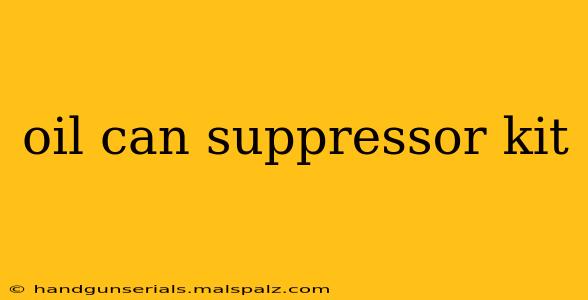The allure of a quieter firearm is undeniable, and for many firearm enthusiasts, the oil can suppressor kit represents a fascinating and potentially cost-effective route to sound suppression. This guide delves into the world of oil can suppressor kits, exploring their construction, legality, performance, and potential drawbacks. We'll cover everything from the basics to advanced considerations, helping you make an informed decision.
What is an Oil Can Suppressor Kit?
An oil can suppressor kit, as the name suggests, typically utilizes repurposed oil cans or similar cylindrical containers as the primary component in building a homemade suppressor. These kits often include necessary parts like baffles, end caps, and potentially other hardware needed for assembly. The design relies on the principle of slowing down and redirecting propellant gases to reduce the sound of a gunshot.
Important Note: The legality of manufacturing and possessing homemade suppressors varies significantly by jurisdiction. Always verify the laws in your specific location before undertaking any suppressor construction. Possession or manufacture of unregistered suppressors can result in severe penalties, including hefty fines and imprisonment.
Construction and Components of an Oil Can Suppressor Kit
While specific components may vary between kits, common elements include:
- Oil Can Body: The repurposed oil can forms the main housing for the suppressor. The can's size and material directly influence the suppressor's overall dimensions and performance.
- Baffles: These are crucial components designed to disrupt the flow of gases, reducing their velocity and noise. They are typically made from metal and are often stacked within the oil can body.
- End Caps: These secure the baffles within the oil can, ensuring proper alignment and containment.
- Hardware: This may include screws, washers, and other fasteners necessary for assembly and to ensure the suppressor's structural integrity.
Performance and Effectiveness
Oil can suppressor kits are generally considered less effective than commercially manufactured suppressors. This is primarily due to several factors:
- Inconsistent Baffle Design: Homemade baffles often lack the precision and engineering found in professionally manufactured suppressors, leading to suboptimal noise reduction.
- Material Limitations: The materials used in oil cans may not be ideal for withstanding the high temperatures and pressures generated during firearm discharge. This can compromise performance and even present safety concerns.
- Lack of Quality Control: Commercial suppressors undergo rigorous testing and quality control to ensure both safety and performance. Homemade kits lack this oversight.
Legal Ramifications and Safety Concerns
The most significant issue surrounding oil can suppressor kits is legality. Constructing and possessing a homemade suppressor without the proper licensing is illegal in many jurisdictions. This can lead to serious legal consequences.
Furthermore, poorly constructed homemade suppressors present significant safety risks:
- Improper Baffle Alignment: Incorrectly installed baffles can lead to malfunctions and potentially dangerous blowback.
- Material Failure: The oil can material may not withstand the high pressures, potentially leading to catastrophic failure.
- Improper Sealing: Leaks in the suppressor can lead to increased noise and potential injury to the shooter.
Alternatives to Oil Can Suppressor Kits
If you're interested in sound suppression, consider exploring legal and safer alternatives:
- Purchasing a Commercially Manufactured Suppressor: This is the safest and most reliable method, ensuring both legality and performance. Following all applicable laws and regulations is crucial.
- Researching Sound Moderators: Explore other sound-reducing devices which might offer a legal and effective alternative.
Conclusion
While oil can suppressor kits may seem like a tempting alternative, the legal risks, performance limitations, and potential safety hazards significantly outweigh the perceived benefits. Prioritizing legality and safety is paramount. Always consult relevant laws and regulations, and seriously consider purchasing commercially manufactured suppressors or exploring alternative solutions if you seek sound reduction for your firearms.

